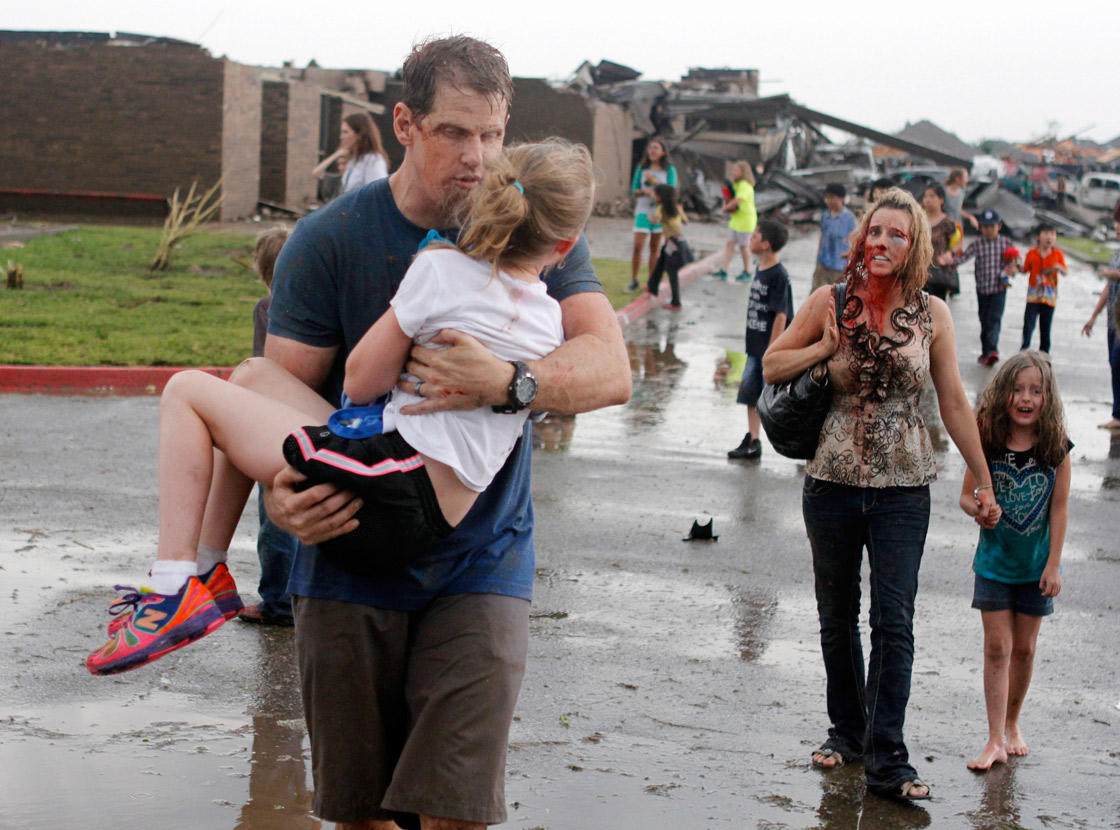Video: White House Press Secretary Jay Carney discusses President Obama’s visit to Oklahoma

MOORE, Okla. – President Barack Obama will travel to tornado-ravaged Moore, Okla., on Sunday.
White House spokesman Jay Carney says the president will view the tornado damage first-hand. He also plans to meet with victims and first responders.
The monstrous tornado barreled through the Oklahoma City suburb Monday afternoon, demolishing an elementary school and reducing homes to piles of rubble. State authorities say two infants were among the 24 people who perished in the twister.
The town of Moore is a community of 41,000 people located about 10 miles from Oklahoma City.
Residents began returning home to their flattened Oklahoma town as authorities said they were confident that all survivors and bodies had been found.
Helmeted rescue workers have been searching tirelessly for survivors and victims, and officials said Tuesday they planned to keep going – sometimes double- and triple-checking home sites. In a press conference Wednesday, Oklahoma city may said about 12,000 to 13,000 homes were damaged or destroyed by the tornado. Emergency crews had trouble navigating devastated neighbourhoods because there were no street signs left. Some rescuers used smartphones or GPS devices to guide them through areas with no recognizable landmarks.
On Wednesday, state officials also said a preliminary estimate suggests the cost of the tornado that hit Moore could be more than $2 billion.
WATCH: Oklahoma recovering from the devastation
Moore Fire Chief Gary Bird said Tuesday he was confident there are no more bodies or survivors in the rubble. Every damaged home had been searched at least once, Bird said, but his goal was to conduct three searches of each building just to be certain there were no more bodies or survivors.
“I’m 98 per cent sure we’re good,” Bird said.

Get daily National news
Monday’s tornado, which travelled 17 miles (27 kilometres) and was 1.3 miles (2 kilometres) wide at points, loosely followed the path of a twister that brought 300 mph (482 kph) winds in May 1999. This week’s tornado was the fourth since 1998 to hit Moore, a middle-class community that has been one of the fastest-growing suburbs of Oklahoma City.
Survivors emerged with harrowing accounts of the storm’s wrath, which many endured as they shielded loved ones in hallways, closets and bathrooms.
WATCH: Oklahoma survivor stories
Larry Harjo, his twin brother and their wives headed for the hospital at the end of the street only minutes ahead of the tornado that ripped the roof off their home and blew out its walls.
“We could see the tornado coming. We could see one side of it, but we couldn’t see the other so we knew it was big,” Harjo, 45, said while standing in his driveway. “There was no surviving that. It was either underground or out of the way kind of thing and we got the hell out of Dodge.”
The hospital was their plan. They had sheltered there before, but this time, it took a direct hit.
“We were directly centre of the hospital and we could hear the cars hitting the building, so we knew it wasn’t going to be nice,” he said. “Thump, thump, thump. Loud thumps.”
“Ceiling tiles falling everywhere. I thought it was going to cave on us there for a minute,” he said.
From the air, large stretches Moore could be seen where every home had been cut to pieces. Some homes were sucked off their concrete slabs. A pond was filled with piles of wood and an overturned trailer. Also visible were large patches of red earth where the tornado scoured the land down to the soil. Some tree trunks were still standing, but the winds ripped away their leaves.
Officials had revised the death toll downward from 51 to 24 on Tuesday after the state medical examiner said some victims may have been double-counted in the confusion immediately after the storm. More than 200 people were treated at area hospitals.
The National Weather Service said the tornado, which was on the ground for 40 minutes, was a top-of-the-scale EF5 twister with winds of at least 200 mph (321 kph) – the first EF5 tornado of 2013.
Search-and-rescue teams focused their efforts at Plaza Towers Elementary School, where the storm ripped off the roof, knocked down walls and destroyed the playground as students and teachers huddled in hallways and bathrooms.
Plaza Towers and another school in Oklahoma City that was not as severely damaged did not have reinforced storm shelters, or safe rooms, said Albert Ashwood, director of the Oklahoma Department of Emergency Management.
More than 100 schools across the state do have safe rooms, he said. He added that a shelter would not necessarily have saved more lives at Plaza Towers.
President Barack Obama pledged to provide federal help and mourned the death of young children who were killed while “trying to take shelter in the safest place they knew – their school.”

Comments